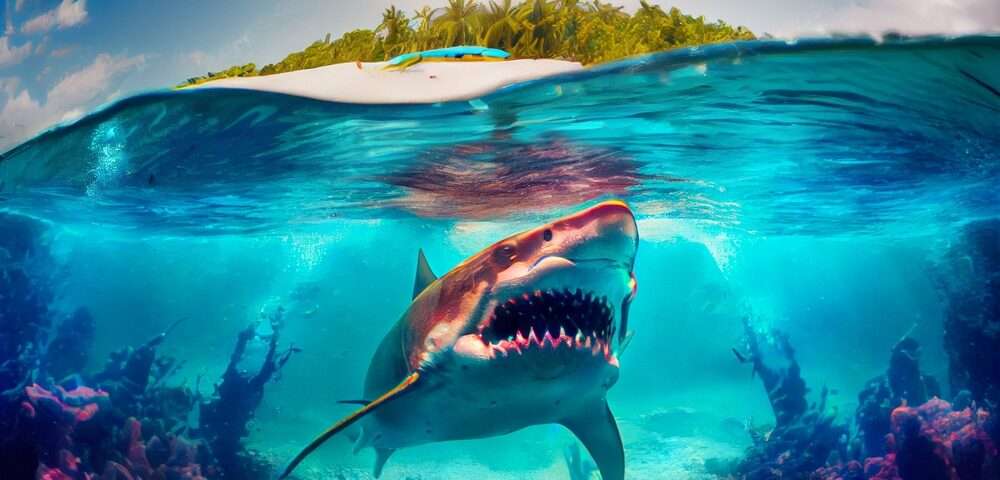The discovery of sharks on cocaine in Florida has recently thrust this phenomenon into the spotlight. While we often associate sharks with predatory prowess and danger, the idea of these apex predators being exposed to narcotics has astonished scientists and the public alike. The U.S. Coast Guard seizes thousands of pounds of cocaine and other drugs from the Atlantic Ocean and the Caribbean Sea every year. Now, some marine biologists believe sharks may have consumed some drugs that were never found. This incident not only raises questions about the environmental impact of illicit drug trafficking but also offers a glimpse into the connection between marine life and the human activities that increasingly invade their habitat. The experts at our Banyan rehab locations share more about the discovery of Florida cocaine sharks and the implications for both marine ecosystems and law enforcement efforts.
Questions about our Facilities or Programs?
Our admissions coordinators are available 24/7 to answer any questions you may have as you consider whether treatment at Banyan is right for you or your loved one.
Sharks and Cocaine in Florida
It started with cocaine bear, and now it’s cocaine sharks. While it may sound like a cheesy movie plot, one marine biologist shared his very real concerns that it may be happening off the coast of Florida. Marine biologist Tom Hird stated, “Sharks are intelligent creatures. They’ve gone up and touched it with the only thing they have - their mouth - and taken a bite out of it. They would have got a hit of cocaine. So, it sounds crazy, but the probability of it occurring is actually quite high.”1
Tom “The Blowfish” Hird came together with other researchers to test out this theory for the Shark Week documentary “Cocaine Sharks.” The team of researchers created packages similar in size to cocaine bricks and filled them with fish powder concentrate, which would trigger a similar dopamine rush as a hit of cocaine.
They then dumped the packages in the Florida Keys, an area where U.S. Border Patrol frequently finds illegal drugs. According to Hird, this didn’t increase aggressive behavior in sharks. Rather, it made them more alert.
Florida-based environmental engineer and lead member of the research team, Dr. Tracy Fanara, also stated, “It’s a catchy headline to shed light on a real problem, that everything we use, everything we manufacture, everything we put into our bodies, ends up in our wastewater streams and natural water bodies, and these aquatic life we depend on to survive are then exposed to that.” She also shared, “We’ve seen studies with pharmaceuticals, cocaine, methamphetamines, ketamine, all of these, where fish are being [affected] by drugs. If these cocaine bales are a point source of pollution, it’s very plausible [sharks] can be affected by this chemical. Cocaine is so soluble that any of those packages open just a little, the structural integrity is destroyed and the drug is in the water.”2
While more research still needs to be conducted to better understand the behaviors of the sharks on cocaine in Florida, Hird hopes the experiment opens the public’s eyes regarding the effects of drugs on our oceans. “Looking at the way pharmaceuticals are going through us and entering our water, that is something that we need to be very, you know, concerned about and start looking into it right now rather than being too worried about some, you know, hepped up sharks reaching for the lasers, dancing ‘til dawn,” he stated.1
Can Sharks Be Affected by Cocaine?
Cocaine is a potent central nervous system (CNS) stimulant that is normally used by and strongly affects humans. While there is limited scientific research concerning these Florida sharks on cocaine, cocaine is unlikely to have a significant impact on them due to certain physiological differences between sharks and humans. As previously mentioned, cocaine may affect sharks by increasing their focus and acting more as a poison, but it wouldn’t produce the same high or adverse effects as it does in people.
Sharks belong to a group of vertebrates known as cartilaginous fish. They have a unique physiology that is substantially different from that of mammals, including humans. Cocaine's mechanisms of action target neurotransmitters in the human brain (including dopamine), affecting mood, cognition, and motor function.
Ultimately, the euphoria is the main reason why people use cocaine. However, sharks have a simpler nervous system, and their neurotransmitter systems are different from those of humans, making it unlikely that they’ll experience these same changes.
What’s more, sharks breathe oxygen through their gills, allowing them to extract oxygen from water. Cocaine primarily affects humans when ingested, inhaled, or injected, leading to changes in heart rate, blood pressure, and behavior. None of these functions are relevant to sharks, as they do not breathe air or have the same cardiovascular system as humans.
While cocaine can have numerous effects on humans, its impact on sharks may differ physiologically and biologically. It’s essential to remember that the use or presence of illegal drugs in aquatic environments can have detrimental effects on ecosystems and other marine life. If humans are not meant to be using cocaine, sharks are even less so.
Getting into treatment is easy with our free insurance verification
"*" indicates required fields
Cocaine Addiction Treatment (For Humans)
Long-term cocaine abuse can lead to a wide range of symptoms, including cardiovascular and respiratory issues and more. As an addictive substance, it’s often difficult for individuals who have become dependent on cocaine to quit without professional support. If this is the case for you or a loved one, don’t wait to get help.
With numerous addiction treatment centers across the nation, Banyan offers cocaine addiction treatment all over the country. If you’d like to learn more about the levels of addiction care nearest you, call Banyan Treatment Centers today at 888-280-4763 or contact us online to schedule a consultation with a specialist.
Sources:
- CBS 47 Fox 30 - Cocaine sharks: Marine biologists believe sharks are eating cocaine dumped off Florida’s coast
- The Guardian – Experts say ‘cocaine sharks’ may be feasting on drugs dumped in Florida
Related Reading:









